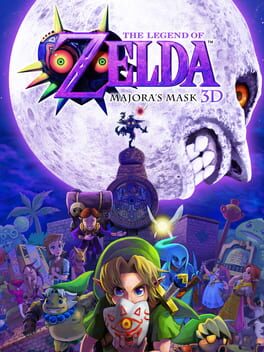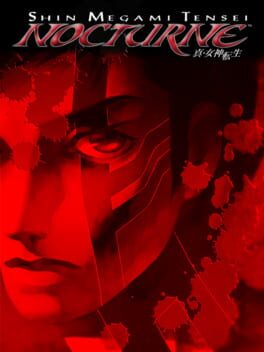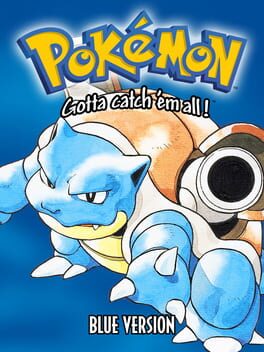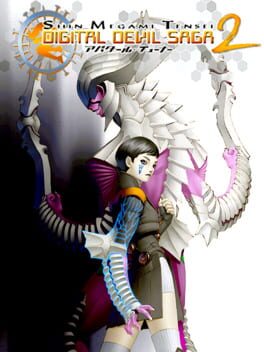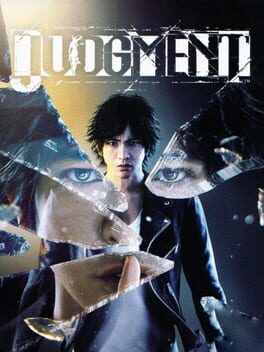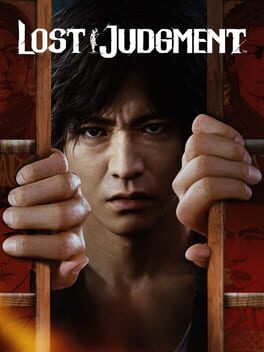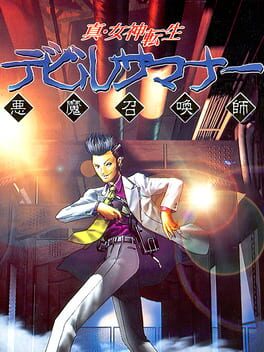Stiefbeef
12 reviews liked by Stiefbeef
The Silver Case
2016
【10 JUNE 2021, THURSDAY_ 】
【LETSHUGBRO'S HOUSE _ 】
【07:38 AM】
ᴸᴱᵀˢᴴᵁᴳᴮᴿᴼ
Augh... █
ᴸᴱᵀˢᴴᵁᴳᴮᴿᴼ
Not this again... █
C
I + M
S
[M]
C + S
I
ᴹᴼⱽᴱᴹᴱᴺᵀ
[E]
S + N
W
ᴹᴼⱽᴱᴹᴱᴺᵀ
[N]
W + E
S
ᶜᴼᴺᵀᴬᶜᵀ
[computer]
[C]
I + M
S
[INBOX] [OUTBOX] [MEMO]
[BACKLOGGD] [SENT] [CHAT]
[INBOX] [OUTBOX] [MEMO]
>>[BACKLOGGD]<< [SENT] [CHAT]
You have logged on to Backloggd.com
--------------------------
(letshugbro) "The Silver Case", huh... █
(letshugbro) Looks interesting. █
(DongSmoker420) it's one of the best games of all time u dumbass █
(K0J1M41SG0D) it's suda51's masterpiece █
(letshugbro) Hmmm.... █
(letshugbro) I guess I should play it. █
(Charizardscumhunter) KILL YOURSELF █
>>[INBOX]<< [OUTBOX] [MEMO]
[BACKLOGGD] [SENT] [CHAT]
>> 21/06/21 • Steam Store • Your order... <<
21/06/21 • Blue Chew • Feedback on...
21/06/21 • Uber Eats • McDonalds 20 P...
--------------------------
10th July 2021
From: Steam Store
To: Lets Hug Bro
Subject: Your order of 'The Silver Case & The 25th Ward: The Silver Case Digital Limited Edition'
Thank you for your recent transaction on Steam.
The items below have been added to your Steam Library.
If you are new to Steam, you can get the free Steam application here.
Purchased DLC will automatically be added. You can find it on the Library page of the base game.
--------------------------
ᴸᴱᵀˢᴴᵁᴳᴮᴿᴼ
. . . █
ᴸᴱᵀˢᴴᵁᴳᴮᴿᴼ
Okay. █
ᴸᴱᵀˢᴴᵁᴳᴮᴿᴼ
Guess I'll try this game out... █
| | | | | | | | | | | | | | | | | | | | | | | | | | | | | | | | | | | | | | | |
【25 JULY 2021 , SUNDAY_ 】
【LETSHUGBRO'S HOUSE _ 】
【1 1:3 7 AM】
ᴸᴱᵀˢᴴᵁᴳᴮᴿᴼ
What the fuck was that all about? █
【LETSHUGBRO'S HOUSE _ 】
【07:38 AM】
ᴸᴱᵀˢᴴᵁᴳᴮᴿᴼ
Augh... █
ᴸᴱᵀˢᴴᵁᴳᴮᴿᴼ
Not this again... █
C
I + M
S
[M]
C + S
I
ᴹᴼⱽᴱᴹᴱᴺᵀ
[E]
S + N
W
ᴹᴼⱽᴱᴹᴱᴺᵀ
[N]
W + E
S
ᶜᴼᴺᵀᴬᶜᵀ
[computer]
[C]
I + M
S
[INBOX] [OUTBOX] [MEMO]
[BACKLOGGD] [SENT] [CHAT]
[INBOX] [OUTBOX] [MEMO]
>>[BACKLOGGD]<< [SENT] [CHAT]
You have logged on to Backloggd.com
--------------------------
(letshugbro) "The Silver Case", huh... █
(letshugbro) Looks interesting. █
(DongSmoker420) it's one of the best games of all time u dumbass █
(K0J1M41SG0D) it's suda51's masterpiece █
(letshugbro) Hmmm.... █
(letshugbro) I guess I should play it. █
(Charizardscumhunter) KILL YOURSELF █
>>[INBOX]<< [OUTBOX] [MEMO]
[BACKLOGGD] [SENT] [CHAT]
>> 21/06/21 • Steam Store • Your order... <<
21/06/21 • Blue Chew • Feedback on...
21/06/21 • Uber Eats • McDonalds 20 P...
--------------------------
10th July 2021
From: Steam Store
To: Lets Hug Bro
Subject: Your order of 'The Silver Case & The 25th Ward: The Silver Case Digital Limited Edition'
Thank you for your recent transaction on Steam.
The items below have been added to your Steam Library.
If you are new to Steam, you can get the free Steam application here.
Purchased DLC will automatically be added. You can find it on the Library page of the base game.
--------------------------
ᴸᴱᵀˢᴴᵁᴳᴮᴿᴼ
. . . █
ᴸᴱᵀˢᴴᵁᴳᴮᴿᴼ
Okay. █
ᴸᴱᵀˢᴴᵁᴳᴮᴿᴼ
Guess I'll try this game out... █
| | | | | | | | | | | | | | | | | | | | | | | | | | | | | | | | | | | | | | | |
【25 JULY 2021 , SUNDAY_ 】
【LETSHUGBRO'S HOUSE _ 】
【1 1:3 7 AM】
ᴸᴱᵀˢᴴᵁᴳᴮᴿᴼ
What the fuck was that all about? █
[post-25th ward face] haha ummmm yea!
first thing to get out of the way: the presentation here is a beast, even by grasshopper's standards. if it weren't for killer7's audio design i'd call 25w their aesthetic peak, so it follows then that this is some of the coldest atmosphere in games ever. you'd think the original silver case was the mobile game.
i mentioned in my flower sun and rain review that i expected 25th ward to be a "return to the grime" after the vacation away, but it turns out that's not entirely the case. 25 coming after 24 implies sequentiality, certain concepts and people do make a return, but the 25th ward--both the game and the setting--won't provide as much continuity as you might assume. in fact it will at many points try to shatter that continuity, and then dare you to look for it anyway. the 25th is influenced by the 24th, its a more rigidly enforced and even more claustrophobic city box, but its acceleration and sterility also makes for a keener sense of meditation on itself from so many angles, honing on in not just the city-net idea but also on the dynamics of surveillance, identity within gender/work/metafiction, exorcising the past, anachronistic reflection on the work from the authors, and games and the player-character.
this is best felt in the interactive space of the game, hugely improved and more considered than its direct predecessor. tsc tries to connect urbanization with cold unfeeling logic by having you solve codes to unlock doors and shit, but they are too infrequent and don't have much behind them beyond the numbers and ciphers themselves. 25w by comparison utilizes wizardry-esque navigation thru indoor hallway mazes, sex chat as repetitive dialogue trees, and constant password/pin entering (i don't make a lot of comparisons to fsr but this element feels the most like that game) to hone in on tsc's original thesis, expressing it more starkly and confidently. one really vivid example for me being when you are dropped into an apartment complex of four 7 floor buildings with 10 rooms per floor, in order to find a man hiding out in one of those 280 rooms. the "city" has been crunched down to "the apartment building" as a database, dehumanized yet also video gamey, onto itself; your partner is a "searcher" who can feel out where he is, so you search by building/disk, then by floor/folder, in order to target a piece of data that is a person.
that said i really had to think over this one, i practically immediately replayed it to sort feelings on it. tsc has the clearest sense of "character development"--how i took it anyway--guiding it and concludes on a more directly emotional note, and the interplay between its two scenarios feels the most effective compared to 25w's further and further divergences between its scenarios. BUT 25w is much tighter its in thematic construction, managing to be ballsier and THE most weapons-grade cryptic shit without completely toppling its jenga tower, and its more fun to think about after the fact in some ways. your preferral of tsc or 25w may depend on, at the risk of oversimplifying what its doing, how willing you are to accept characters that are more seemingly static in their personality, or at least foggier (the big exception being in matchmaker, imo the weakest scenario that feels unfinished by its end but is enjoyable on its own terms for having the most bluntly dynamic arc for its characters) for the sake of interrogating their role in the world. in many cases the players perception of them changing with their understanding of the story is what matters, and that is admittedly used to great effect with further readings. but its difficult to say how i mean this kind of thing exactly
i was ready to call it my least favorite of the trilogy after first finishing it but now it may be slightly better than tsc? im still not 100% sure where to place this, other than that i know fsr was basically predetermined to be my favorite so i can say its not at that level for me, but ultimately all three games are bangers so yeah. did my best to make a review that wouldn't need a spoiler-tag but my god at this point i am just constipated to get into this more
first thing to get out of the way: the presentation here is a beast, even by grasshopper's standards. if it weren't for killer7's audio design i'd call 25w their aesthetic peak, so it follows then that this is some of the coldest atmosphere in games ever. you'd think the original silver case was the mobile game.
i mentioned in my flower sun and rain review that i expected 25th ward to be a "return to the grime" after the vacation away, but it turns out that's not entirely the case. 25 coming after 24 implies sequentiality, certain concepts and people do make a return, but the 25th ward--both the game and the setting--won't provide as much continuity as you might assume. in fact it will at many points try to shatter that continuity, and then dare you to look for it anyway. the 25th is influenced by the 24th, its a more rigidly enforced and even more claustrophobic city box, but its acceleration and sterility also makes for a keener sense of meditation on itself from so many angles, honing on in not just the city-net idea but also on the dynamics of surveillance, identity within gender/work/metafiction, exorcising the past, anachronistic reflection on the work from the authors, and games and the player-character.
this is best felt in the interactive space of the game, hugely improved and more considered than its direct predecessor. tsc tries to connect urbanization with cold unfeeling logic by having you solve codes to unlock doors and shit, but they are too infrequent and don't have much behind them beyond the numbers and ciphers themselves. 25w by comparison utilizes wizardry-esque navigation thru indoor hallway mazes, sex chat as repetitive dialogue trees, and constant password/pin entering (i don't make a lot of comparisons to fsr but this element feels the most like that game) to hone in on tsc's original thesis, expressing it more starkly and confidently. one really vivid example for me being when you are dropped into an apartment complex of four 7 floor buildings with 10 rooms per floor, in order to find a man hiding out in one of those 280 rooms. the "city" has been crunched down to "the apartment building" as a database, dehumanized yet also video gamey, onto itself; your partner is a "searcher" who can feel out where he is, so you search by building/disk, then by floor/folder, in order to target a piece of data that is a person.
that said i really had to think over this one, i practically immediately replayed it to sort feelings on it. tsc has the clearest sense of "character development"--how i took it anyway--guiding it and concludes on a more directly emotional note, and the interplay between its two scenarios feels the most effective compared to 25w's further and further divergences between its scenarios. BUT 25w is much tighter its in thematic construction, managing to be ballsier and THE most weapons-grade cryptic shit without completely toppling its jenga tower, and its more fun to think about after the fact in some ways. your preferral of tsc or 25w may depend on, at the risk of oversimplifying what its doing, how willing you are to accept characters that are more seemingly static in their personality, or at least foggier (the big exception being in matchmaker, imo the weakest scenario that feels unfinished by its end but is enjoyable on its own terms for having the most bluntly dynamic arc for its characters) for the sake of interrogating their role in the world. in many cases the players perception of them changing with their understanding of the story is what matters, and that is admittedly used to great effect with further readings. but its difficult to say how i mean this kind of thing exactly
i was ready to call it my least favorite of the trilogy after first finishing it but now it may be slightly better than tsc? im still not 100% sure where to place this, other than that i know fsr was basically predetermined to be my favorite so i can say its not at that level for me, but ultimately all three games are bangers so yeah. did my best to make a review that wouldn't need a spoiler-tag but my god at this point i am just constipated to get into this more
This review contains spoilers
true demon ending is the unequivocal favorite amongst nocturne's admirers. given the heavy signposting in the early game, its gameplay density, and its sensational finale i get it. i can't scoff at people for picking an option that, within the context of maniax, is the safest and most logical course of action. but, if we ground ourselves within the confines of vanilla nocturne, a space in which the stance of toppling the very concept of samsara is nonexistent, we open its narrative up to more negotiable interpretations that wedges well with the rest of the franchise motifs. interpretations that get cloaked under the shadow of the extravagant, dante-flaunting rerelease. conversations the western audience never got to have, lost in translation by the glory of fighting the great will itself.
the vortex world carries itself with an ambiance of cynicism; without fail, the conception has occurred not by the hand of divine intervention but from the hearts of the despairing and bitter. an undercurrent of idealism, pessimism, and nihilism prevails through the every day, and deconstructing and remodeling what some perceive as the vices of it is how we settle these mental qualms. it’s how we’ve always progressed, in a world rifted in systematic malevolency it's the only endpoint and the conception acts as a natural materialization of this custom. thusly, when we glance at the psychotic ramblings of aradia we wonder why one would have faith in such degeneracy. why partaken in a journey to actualize a new vision of the world just to go back to the norm? it's all the more reducted by yuko takao’s spineless benevolence, being the maiden who trigger the catalyst yet realizing all too late she never desired radicality to begin with. while the intricacies of yosuga could only be contrived from the minds of the confused and traumatized, at the very least that entails seizing an opportunity to mold the world as you see fit. for what purpose would one desire to go back to the days of old in a culture of constantly chasing evolution?
returning to a neutral has been the thematic cornerstone of smt, but for vanilla nocturne in particular it’s so hard to make a satisfactory case for it. there’s no explicit confession that the real is broken and needs to be reevaluated, leading to look at their messiahs and balk at them. when yuko disillusionment reaches its apex, she confides in a divine sponsor in hopes that they will give them a reason. but, aradia never bestows her a reason, only abstractions and trials. instead aradia insists to us that to apprehend freedom, we must commit an act of dissociation. remove ourselves from the idea that our perspective is the only truth and reason, and relish ourselves in obliquity. realize that even with the fruition of freedom, we are doomed to witness the same ritual death and rebirth, the implications of which are further amped by the innate absurdity of freedom. there is a very real possibility that, by virtue of following the name of freedom, someone could simply inaugurate the conception again and there's an even higher possibility of you not living to see it. freedom is a path cursed by plague, pain, ridicule, betrayal, rejection, defeat, et cetera, and allying with it is to sign our death certificates.
yet, aradia entertains our freedom. she wants us to do what we believe is right, regardless of one's mortality. she feels that by rejecting the anti-social nation of reason in exchange for the horrifying ramifications of autonomy, each of us can maximize our potential. we wonder about an innately meaningless environment, but it leaves us to fosters our own meaning, our own reasons, and communicate that outlook with others, fleshing out our ultimately limited perspectives in the process. we may acknowledge how our truths may never align with others in comfort, given your truths is as powerless as any other. it's a condition as spirited as it is unsettling and in our absurd quest to find this abstract quintessence we find beauty. we're fools that bear the name of freedom, and no insular reason could hope to capture that essence. the true demon ending may be emotionally cathartic and a sincere call for systematic change and destruction, but we are not armed with mythological beings. we cannot run up to god and demand him to spare us from the pressure and anxiety of cyclic living. we can only play the cards we're dealt.
the vortex world carries itself with an ambiance of cynicism; without fail, the conception has occurred not by the hand of divine intervention but from the hearts of the despairing and bitter. an undercurrent of idealism, pessimism, and nihilism prevails through the every day, and deconstructing and remodeling what some perceive as the vices of it is how we settle these mental qualms. it’s how we’ve always progressed, in a world rifted in systematic malevolency it's the only endpoint and the conception acts as a natural materialization of this custom. thusly, when we glance at the psychotic ramblings of aradia we wonder why one would have faith in such degeneracy. why partaken in a journey to actualize a new vision of the world just to go back to the norm? it's all the more reducted by yuko takao’s spineless benevolence, being the maiden who trigger the catalyst yet realizing all too late she never desired radicality to begin with. while the intricacies of yosuga could only be contrived from the minds of the confused and traumatized, at the very least that entails seizing an opportunity to mold the world as you see fit. for what purpose would one desire to go back to the days of old in a culture of constantly chasing evolution?
returning to a neutral has been the thematic cornerstone of smt, but for vanilla nocturne in particular it’s so hard to make a satisfactory case for it. there’s no explicit confession that the real is broken and needs to be reevaluated, leading to look at their messiahs and balk at them. when yuko disillusionment reaches its apex, she confides in a divine sponsor in hopes that they will give them a reason. but, aradia never bestows her a reason, only abstractions and trials. instead aradia insists to us that to apprehend freedom, we must commit an act of dissociation. remove ourselves from the idea that our perspective is the only truth and reason, and relish ourselves in obliquity. realize that even with the fruition of freedom, we are doomed to witness the same ritual death and rebirth, the implications of which are further amped by the innate absurdity of freedom. there is a very real possibility that, by virtue of following the name of freedom, someone could simply inaugurate the conception again and there's an even higher possibility of you not living to see it. freedom is a path cursed by plague, pain, ridicule, betrayal, rejection, defeat, et cetera, and allying with it is to sign our death certificates.
yet, aradia entertains our freedom. she wants us to do what we believe is right, regardless of one's mortality. she feels that by rejecting the anti-social nation of reason in exchange for the horrifying ramifications of autonomy, each of us can maximize our potential. we wonder about an innately meaningless environment, but it leaves us to fosters our own meaning, our own reasons, and communicate that outlook with others, fleshing out our ultimately limited perspectives in the process. we may acknowledge how our truths may never align with others in comfort, given your truths is as powerless as any other. it's a condition as spirited as it is unsettling and in our absurd quest to find this abstract quintessence we find beauty. we're fools that bear the name of freedom, and no insular reason could hope to capture that essence. the true demon ending may be emotionally cathartic and a sincere call for systematic change and destruction, but we are not armed with mythological beings. we cannot run up to god and demand him to spare us from the pressure and anxiety of cyclic living. we can only play the cards we're dealt.
Pokémon Blue Version
1996
The Silver Case
2016
thinking about this alot after finishing it so heres a journal with the "perfect reader" in mind (sorry). everybody loves transmitter and tbf kusabi and sumio are pretty good, to the detriment most of the others in the hcu imo, but placebo really is where the heart of this game is. morishima's routine and the way his i-dont-care cynicism gets challenged crystallizes the heady themes you deal with in transmitter, maybe a little too scattered-ly handled in that scenario by itself until later chapters get somewhat better footing, into a more personal and comparatively more parseable focus. the back and forth of understanding events emotions and associations between scenarios helps them both and made this more emotionally involving than i expected. that last chat with erika makes me cry just thinking abt it.
only played killer7 before this but i think prefer this to it by a little, even if k7 is more certain in what its doing. am now real excited to get into kill the past and see what fsr and 25th ward brings, and might replay k7 and finally fix feelings on it once i get through those.
only played killer7 before this but i think prefer this to it by a little, even if k7 is more certain in what its doing. am now real excited to get into kill the past and see what fsr and 25th ward brings, and might replay k7 and finally fix feelings on it once i get through those.
an odd one out of suda's ouevre. largely avoids the fixation on violence grasshopper's games are known for, foregoing the hard boiled cybercrime noir of the silver case, the post-9/11 sentai horror bloodbath of killer7, and the sillier nerdfighter grindhouse bloodbath of no more heroes (which would set a pattern followed by most of the studio's subsequent games as bloodbaths, with suda only occasionally as the director. its humor is also pretty close to fsr's at times). tonally very different from these but thematically very familiar, flower sun and rain should be taken as both sequel AND side story at once to tsc, and its very hard to talk about without also bringing up that game, in a way i dont think is as true for the more standalone k7 or nmh. there really is an appeal i'm finally starting to understand with taking tsc, this, and likely 25th ward--which is next up for me--as a trilogy with its own arc.
the silver case itself, as the starting point, is obsessed with the internet and the city, finding a formal link between the two. it's in the clacking text boxes, the film windows, the backgrounds with rotating numbers and flashing shapes and out of context phrases, altogether an abstracted space of words and pictures that feels like website presentation. its also in the player movement thats restricted to hotspots with rigid pathing befitting of street grids, apartment buildings, your home that you make the same linear motions in everyday. both feel non-naturalistic and cramped, but that just emphasizes the experience we have with these spaces. surrounded by cold geometric cells online and off, everyone so close together yet so far away. it gets exhausting, being unable to find ourselves outside of these boxes, to get some picture of truth. the game recognizes the need to reach for the light within yourself, outside of this darkness, but what would that even look like?
fsr shows a world "outside" by taking the reverse approach. your movement is "freer", your sense of space perceivable with the player character's own two legs in relation to analog control. hotel guests, staff, and people of the island get in your way to ask for "help", more or less, with tasks that are nonsensical in their solution and often ridiculous in their premise too, but the experience of it creates a sense you are working for a net good out of mondo's own developing kindness. you gain more and more of the world to move in until you eventually feel your sense of self stretch across long roads and pathways--literally as the in-game guidebook itself says. you can check bathrooms, take unnecessary detours, hear the rolling waves and the chirping birds. maybe this is where you can find the light.
but this "naturalistic" feeling of freedom the game allows compared to tsc, however, belies the truth of lospass's paradise as being just as artificial as the 24 wards, in a different way. the puzzles you help others with are just solved with codes based off relevant trivia from a pamphlet, blatantly mechanical logic as it can get (reminds me a little of riven, though the juxtaposition of natural and unnatural here is more unmistakably intentional). the staff hide themselves behind friendly smiles, and some of those you help may be tricking you. the hotel, a temporary place to stay, is the only "living space" you can find. structures feel too new, too slick, to feel some engrained identity behind them. the island lost its own past, perhaps even had it stolen, with whatever it is that looks like "history" you find not necessarily being factual. it goes beyond feeling touristy, it's like people can't really live and be oneself here for all that long.
what i like about flower sun and rain not being a silver case sequel in name is that its another way the game frames itself as an escape from the confines of the wards--meaning then that 25th ward may be a return to the grime so to speak, to confront that space again. fsr is trying to forget the past that built it, only to find a new kind of artifice that reminds you of the one you knew before. this doesn't mean the game is saying its escapism is ultimately useless and selfish though, because when you're in the dark it might be a matter of needing to see something different, anything else, to gain a better understanding of yourself and your past that made you yourself. new memories tinged by a new sun, even as artificial light, might be whats needed to really move forward.
loved doing math homework and taking daily jogs on my tropical vacay. ps the walking around wasn't even as bad as it was made out to be, you guys are just weak and need to break your brain like i did with aimlessly backtracking for no real reward in other games that have even larger and emptier worlds
the silver case itself, as the starting point, is obsessed with the internet and the city, finding a formal link between the two. it's in the clacking text boxes, the film windows, the backgrounds with rotating numbers and flashing shapes and out of context phrases, altogether an abstracted space of words and pictures that feels like website presentation. its also in the player movement thats restricted to hotspots with rigid pathing befitting of street grids, apartment buildings, your home that you make the same linear motions in everyday. both feel non-naturalistic and cramped, but that just emphasizes the experience we have with these spaces. surrounded by cold geometric cells online and off, everyone so close together yet so far away. it gets exhausting, being unable to find ourselves outside of these boxes, to get some picture of truth. the game recognizes the need to reach for the light within yourself, outside of this darkness, but what would that even look like?
fsr shows a world "outside" by taking the reverse approach. your movement is "freer", your sense of space perceivable with the player character's own two legs in relation to analog control. hotel guests, staff, and people of the island get in your way to ask for "help", more or less, with tasks that are nonsensical in their solution and often ridiculous in their premise too, but the experience of it creates a sense you are working for a net good out of mondo's own developing kindness. you gain more and more of the world to move in until you eventually feel your sense of self stretch across long roads and pathways--literally as the in-game guidebook itself says. you can check bathrooms, take unnecessary detours, hear the rolling waves and the chirping birds. maybe this is where you can find the light.
but this "naturalistic" feeling of freedom the game allows compared to tsc, however, belies the truth of lospass's paradise as being just as artificial as the 24 wards, in a different way. the puzzles you help others with are just solved with codes based off relevant trivia from a pamphlet, blatantly mechanical logic as it can get (reminds me a little of riven, though the juxtaposition of natural and unnatural here is more unmistakably intentional). the staff hide themselves behind friendly smiles, and some of those you help may be tricking you. the hotel, a temporary place to stay, is the only "living space" you can find. structures feel too new, too slick, to feel some engrained identity behind them. the island lost its own past, perhaps even had it stolen, with whatever it is that looks like "history" you find not necessarily being factual. it goes beyond feeling touristy, it's like people can't really live and be oneself here for all that long.
what i like about flower sun and rain not being a silver case sequel in name is that its another way the game frames itself as an escape from the confines of the wards--meaning then that 25th ward may be a return to the grime so to speak, to confront that space again. fsr is trying to forget the past that built it, only to find a new kind of artifice that reminds you of the one you knew before. this doesn't mean the game is saying its escapism is ultimately useless and selfish though, because when you're in the dark it might be a matter of needing to see something different, anything else, to gain a better understanding of yourself and your past that made you yourself. new memories tinged by a new sun, even as artificial light, might be whats needed to really move forward.
loved doing math homework and taking daily jogs on my tropical vacay. ps the walking around wasn't even as bad as it was made out to be, you guys are just weak and need to break your brain like i did with aimlessly backtracking for no real reward in other games that have even larger and emptier worlds
completely unjustifiable and anarchic. what we have in FSR is a surrealist pseudosequel to a 1999 visual novel that was not localized at the time that FSR was, making the game upon original release borderline incomprehensible. compelling analysis can still be written without knowledge of the silver case, but the vast majority have settled into a comfortable deconstructionist lens - austin walkers interpretation is one such prominent take, evincing the game's dissatisfactory DS implementations (useless bonus puzzles, step counter) as part and parcel of the game's antagonistic design, antithetical to its own industry ('It's mean. It's cruel. I kind of love it.')
despite this, one of the most beautiful games ever and the work of someone i am increasingly convinced by the day is one of the most valuable devs in the industry. masterful in tone and delivery, FSR sharply threads together various disparate narrative and thematic strands to excellent effect, resulting in an anti-game package that stands head and shoulders above the crowd by closely resembling something akin to video game poetry. what does FSR pontificate on, if not to act the provocateur or to senselessly challenge convention? in no short order: truth, mystery, identity, purity, artifice, colonialism, primitivism, paradise, death, rebirth, spirituality. the influence of kafka, jodorowsky, and lynch, for example, is felt strongly, but never so strong that it is cynical or unoriginal - to be ensnared in suda's mosaic of cultural references is only to gain appreciation for the ingenuity of his work.
i think FSR and NMH's reputations precede them such that suda is seen as a figure whose sole developmental shtick lies in deconstruction and satire, but FSR is so much more than that - it only requires the player to ascend to match its level, to bask in the sunlight and take solace in ocean waves, to intuit what can't be sensed through mere deduction and speculation. truth is, after all, as natural, forthcoming, and innate as the bright blue skies around us, sometimes.
despite this, one of the most beautiful games ever and the work of someone i am increasingly convinced by the day is one of the most valuable devs in the industry. masterful in tone and delivery, FSR sharply threads together various disparate narrative and thematic strands to excellent effect, resulting in an anti-game package that stands head and shoulders above the crowd by closely resembling something akin to video game poetry. what does FSR pontificate on, if not to act the provocateur or to senselessly challenge convention? in no short order: truth, mystery, identity, purity, artifice, colonialism, primitivism, paradise, death, rebirth, spirituality. the influence of kafka, jodorowsky, and lynch, for example, is felt strongly, but never so strong that it is cynical or unoriginal - to be ensnared in suda's mosaic of cultural references is only to gain appreciation for the ingenuity of his work.
i think FSR and NMH's reputations precede them such that suda is seen as a figure whose sole developmental shtick lies in deconstruction and satire, but FSR is so much more than that - it only requires the player to ascend to match its level, to bask in the sunlight and take solace in ocean waves, to intuit what can't be sensed through mere deduction and speculation. truth is, after all, as natural, forthcoming, and innate as the bright blue skies around us, sometimes.
You ever wondered about whether there was a game that used every single feature of the Wii U? No? Well ok then.
This is entirely a puzzle game that will ask you to change your gaze between the Wii U gamepad and the TV constantly, to mostly decent effect. The designers were smart in making this an entirely non-action affair as it would've been very messy, but considering the relaxed pace of the game checking the gamepad to fix some settings and "testing" them on the field actually is very natural.
Another clever thing is how the gamepad is used to simulate being in an actual spaceship, with its own OS and interface. There was clearly tons of attention to detail put into the "immersive" aspect of the game, which also continues in its storytelling. While light, it actually is fairly interesting, and any piece of media that starts with a satirical fake ad is always awesome in my book.
What isn't so awesome is this game after all the luster wears off. After a while there's a sense of repetition that starts setting in, because while the obstacles to overcome technically change fairly frequently, all you're doing still boils down to checking your current stats, tuning them for the current situation, and proceeding if you tuned the ship correctly. This is a game that actually gets easier the more you play it, because there's no real curveball thrown at the player after the first 30 minutes.
When it comes down to it, Affordable Space Adventures is an interesting puzzle game that is solid enough. If you're still interested in the Wii U and its gimmicks this game is very much recommended, as it's one of the only products of its kind to use literally everything from the touchscreen, to the double screen aspect, to even Miiverse. I just wish this game had more meat and less potatoes, to make a cringey food analogy.
This is entirely a puzzle game that will ask you to change your gaze between the Wii U gamepad and the TV constantly, to mostly decent effect. The designers were smart in making this an entirely non-action affair as it would've been very messy, but considering the relaxed pace of the game checking the gamepad to fix some settings and "testing" them on the field actually is very natural.
Another clever thing is how the gamepad is used to simulate being in an actual spaceship, with its own OS and interface. There was clearly tons of attention to detail put into the "immersive" aspect of the game, which also continues in its storytelling. While light, it actually is fairly interesting, and any piece of media that starts with a satirical fake ad is always awesome in my book.
What isn't so awesome is this game after all the luster wears off. After a while there's a sense of repetition that starts setting in, because while the obstacles to overcome technically change fairly frequently, all you're doing still boils down to checking your current stats, tuning them for the current situation, and proceeding if you tuned the ship correctly. This is a game that actually gets easier the more you play it, because there's no real curveball thrown at the player after the first 30 minutes.
When it comes down to it, Affordable Space Adventures is an interesting puzzle game that is solid enough. If you're still interested in the Wii U and its gimmicks this game is very much recommended, as it's one of the only products of its kind to use literally everything from the touchscreen, to the double screen aspect, to even Miiverse. I just wish this game had more meat and less potatoes, to make a cringey food analogy.

